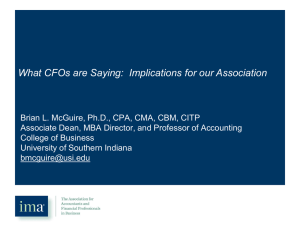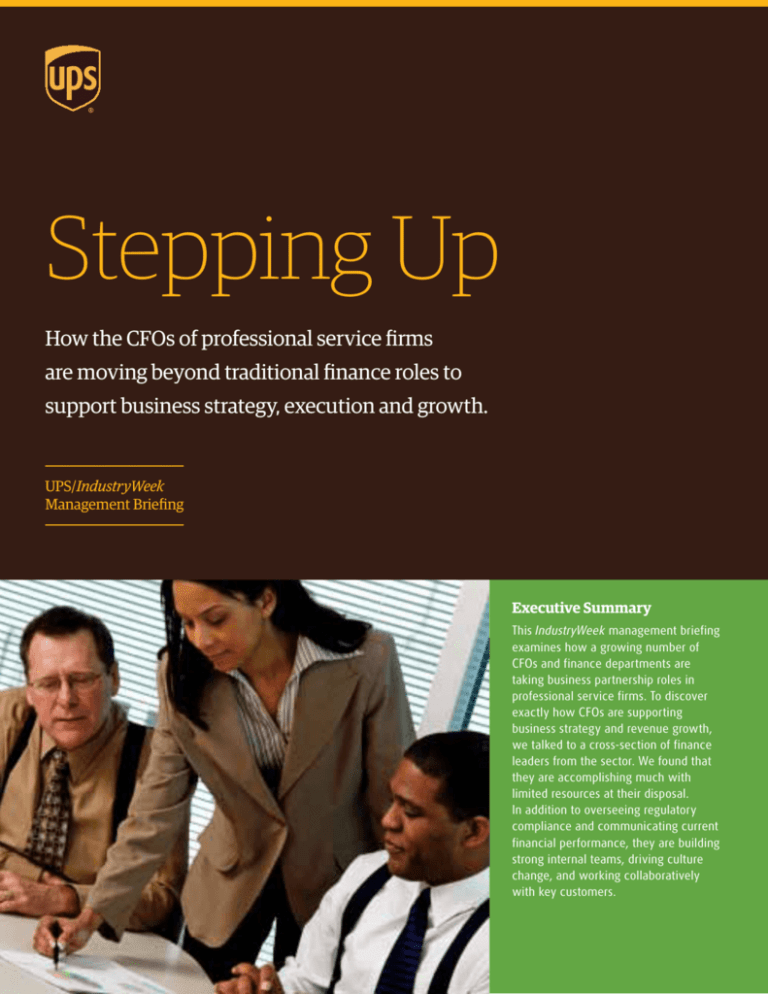
Stepping Up
How the CFOs of professional service firms
are moving beyond traditional finance roles to
support business strategy, execution and growth.
UPS/IndustryWeek
Management Briefing
Executive Summary
This IndustryWeek management briefing
examines how a growing number of
CFOs and finance departments are
taking business partnership roles in
professional service firms. To discover
exactly how CFOs are supporting
business strategy and revenue growth,
we talked to a cross-section of finance
leaders from the sector. We found that
they are accomplishing much with
limited resources at their disposal.
In addition to overseeing regulatory
compliance and communicating current
financial performance, they are building
strong internal teams, driving culture
change, and working collaboratively
with key customers.
Cindy Milrany’s passion is infectious.
She is chief financial officer and chief
administrative officer of Freese and
Nichols, Inc. (FNI). The 120-yearold engineering, architecture and
environmental services firm based in
Fort Worth, Texas, won the Malcolm
Baldrige National Quality Award in 2010.
She championed that effort, and guides
the company’s ongoing improvement
activities.
“CFOs need to be doing more than just
running the financial side of the business,”
she says. “I always wanted to be a CFO
who was a partner with operations, not
the CFO who was always pointing out
what operations is doing wrong.”
“CFOs need to be doing
more than just running
the financial side of the
business.”
— Cindy Milrany, CFO and CAO,
Freese and Nichols, Inc.
Milrany’s knowledge and enthusiasm
for the Baldrige took root when the
responsibility for data reporting and
analysis required of program participants
first fell on her shoulders. She credits
Baldrige’s core tenets with guiding FNI’s
focus on operational improvement and its
record of steady revenue growth, which
the company maintained even during the
2008-2009 economic downturn.
Milrany is just one of many CFOs at
professional service firms who are
passionate about the value they’re
able to bring to their organizations
beyond reporting the numbers. Indeed,
the leadership role seems to attract
finance professionals who relish a broad
range of challenges and a dynamic job
description.
The CFO job, as this IndustryWeek
management briefing explores, is being
transformed by a number of internal and
external factors. Those factors are driving
demands for the CFO and the finance
department to take a partnership role in
supporting business goals and growth.
That comes with a wide array of new
responsibilities.
Expanding CFO
Responsibilities
In addition to finance leadership, CFOs
in all types and sizes of companies
today are taking responsibility for
information technology, operations and
risk management. Other duties (if not
job titles) include chief opportunity
officer in charge of rooting out sources of
potential profit growth, chief investment
officer in charge of acquisition targeting
and evaluation, and chief metrics
officer providing the daily performance
measures necessary for optimizing
management decisions.1
Because of their connection to the
financial side of the business, CFOs are
in a unique position to provide pragmatic
support for realizing the business
strategy. This includes:
• Making sure capital is available and
allocated to new opportunities
• Identifying and removing growth
restraints
• Using data analysis to reduce
uncertainty and enable decision
making
• Identifying and tracking potential
market disruptions
• And providing the intelligence to
evaluate underperforming operations.2
Evolving priorities require a CFO with
a well-honed ability to communicate,
build trust and maintain collaborative
relationships with other department
heads, business unit leaders and the
investment community. This is in addition
to being in charge of preparing financial
statements and regulatory compliance.
All of that is a tall order even for the
CFOs of multi-billion-dollar corporations
with sizeable budgets and support
staff. In contrast, the vast majority of
professional service firms tend to be
small and medium-sized companies with
limited finance departments. To find
out how they are supporting business
strategy and growth, we talked to a
cross-section of finance leaders at such
firms. As it turns out, they’re managing to
accomplish much with limited resources
and time at their disposal.
Building a Strong Bench
Across the board the CFOs we
interviewed reported that they rely on
top-notch controllers and strong finance
and accounting teams. Delegating
some responsibilities for accounting,
compliance and treasury functions
creates some leeway to dedicate more
attention to supporting the management
team’s growth initiatives.
In any professional service business,
whether it’s consulting, accounting
or engineering, having a competent
and effective team is the only way to
accomplish the organization’s growth
goals, says John Vaglica. He is CFO
and executive VP of finance for Risk
Strategies Company, a mid-sized
insurance brokerage headquartered
in Boston. When he’s hiring new
people, Vaglica looks for businessminded finance professionals. The audit
backgrounds of many job candidates
can cause them to think more like
compliance officers than solutions
providers, he says.
Risk Strategies has freed up capacity
by outsourcing routine transaction
processing, such as billing and
reconciliation, to overseas service
providers. Today his finance team
spends most of their time doing financial
analysis. “I want to know how we did
last month and the month before that,
UPS/IndustryWeek Management Briefing | 2
advisory partner at Anchin, Block
& Anchin LLP, based in New York.
“Communication is key to gaining
people’s trust,” he adds. “They need to
trust that the CFO is putting the business
first, and that all of the information
they’re providing is for that purpose.”
“I want to know how we
did last month and the
month before that, but I
also want to know what
that means for the next
two to three months.”
— John Vaglica, CFO and executive VP of
finance, Risk Strategies Company
but I also want to know what that means
for the next two to three months. Is there
a trend? Is there something going on that
we need to focus in on?” he explains.
Like most finance leaders, Vaglica is
deeply involved in annual planning
and budgeting. He says that closely
aligning the bonuses of department
heads and branch leaders with the
firm’s financial goals helps create a
culture of cooperation with the finance
department.
“It creates a better partnership because
they will call me or my controller or one
of our analysts with a challenge, and
ask for help figuring it out,” says Vaglica.
“The leaders in each of our branches
trust that we’re going to help them
find creative solutions, as opposed to
hindering them from solving problems.”
Maintaining that trust is a core element
of finance efforts to provide additional
value and support to the rest of the
organization. The information that
finance needs to do its job comes from
other areas of the company, explains
Gregory Wank, an accounting and
The finance team uses such performance
data to adjust quarterly budgets and
expectations, raise a flag when anything
starts to go off track, and help investigate
the possible root causes. One of the
major challenges for growing companies,
according to Wank, is making sure the
working capital is available to support
the sales growth.
Depending on the type of business,
Wank says that many business owners
decide that they need a full-time finance
person when they reach about $100
million in sales. Until then many rely on
bookkeepers, controllers and outside
accountants like his firm to help with
budgets and monitor performance.
Below that revenue point, if a company
does have a CFO, the job responsibilities
can be extremely fluid.
That’s certainly been the case for Jason
Langston, CFO and managing partner of
GPS Capital Markets, a foreign exchange
brokerage with 80 employees in offices
worldwide and headquarters in Salt
Lake City. As one of the firm’s three
co-founders, Langston has assumed a
variety of responsibilities for growing
the business.
For example, he is the engagement
partner for some of the company’s
top customers, resolving any issues
and making sure they’re being well
taken care of. In 2012 he opened their
new office in London. That included
everything from finding office space to
hiring local managers, taking care of
regulatory licensing requirements, setting
up bank contacts, and making sales calls.
CFO as Culture Steward
This do-whatever-it-takes attitude is a
key element of GPS Capital’s culture,
according to Langston. “We try to instill,
with all of our employees, the fact that
this is an entrepreneurial organization,”
he says.
Company leaders expect everyone to
approach their work and responsibilities
as if they were running their own
company, giving them the freedom
and independence to do so. Langston
says that such a culture has been key
to their success and growth. This type
of cultural stewardship by setting an
example and communicating company
performance was a common theme
among the professional service firm
CFOs we interviewed.
“We have an amazing culture at Freese
and Nichols,” says CFO Cindy Milrany.
“As we’ve grown, we have been very
careful to manage that culture. It’s
become a big part of who we are.”
The company conducts a culture survey
every two years to measure how they’re
doing and develop action plans to move
the culture in the direction the leadership
team wants it to go. One area that
they’ve been working on in recent years
is increasing individual accountability.
Milrany is part of that effort, which
“Communication is key
to gaining people’s trust.
They need to trust that
the CFO is putting the
business first.”
— Gregory Wank, accounting and advisory
partner, Anchin, Block & Anchin LLP
UPS/IndustryWeek Management Briefing | 3
involves meeting with group managers
every other month to review key
indicators, goals, and the root causes of
any performance gaps.
“We try to instill, with all of
our employees, the fact that
this is an entrepreneurial
organization,”
The company’s engagement with the
Baldrige Award has strengthened that
culture, Milrany says. “We use Baldrige
to manage our company,” she explains.
“It is our management system.”
Process excellence and efficiency in
finance can reinforce the department’s
role as a business partner, according
to Tom Van Der Moere, CFO and CIO of
Chicago-based law firm Neal Gerber
& Eisenberg. As CIO he looks for
information technology that supports
effective processes. That means tearing
down business processes and optimizing
them before implementing any
automated solutions.
Van Der Moere offers the new client
intake process as an example, which
can be a thorn in the side of many legal
firms. The immediate goal is to get an
account open quickly so attorneys can
start working for the client. Doing that
requires some due diligence in the form
— Jason Langston, CFO and managing
partner of GPS Capital Markets
where we can add value is distilling
all of that data into something that’s
meaningful and useful to the attorneys.”
Analyzing pricing and fee structures, and
providing that information to attorneys
in a timely fashion, has been a major
area of focus for Van Der Moere’s finance
team. They have broken down litigation
cases into their constituent parts, looked
at the amount of time each step has
taken in previous cases, how they’ve
staffed them, and then developed a
target cost range that the attorneys can
use with potential clients.
“It’s a win-win for the firm and the
client because it gives them some
predictability and protection that fees
“We’re doing things to sharpen
our cost management, which
allows us to build flexibility
into our pricing models and
still meet the client’s need.”
— Tom Van Der Moere, CFO and CIO, Neal Gerber
& Eisenberg
of conflict-of-interest reviews, credit
checks and signed engagement letters.
His team has worked at analyzing those
processes and workflows, then removing
the redundancies and inefficiencies.
“We’re doing things to sharpen our cost
management, which allows us to build
flexibility into our pricing models and still
meet the client’s needs,” he adds. “Law
firms are filled with volumes of data
these days. From a finance perspective,
won’t skyrocket, while allowing the firm
to realize some revenue and protect
itself,” he says. Such knowledge and
analysis also underscores the firm’s
experience at handling particular matters
with potential clients.
The Changing Profile of the
Successful CFO
As introduced above, today’s professional
service firm CFOs have a broad range of
© 2014 United Parcel Service of America, Inc. UPS, the UPS brandmark and the color brown
are registered trademarks of United Parcel Service of America, Inc. All rights reserved.
responsibilities that extend far beyond
the traditional financial reporting,
planning and analysis. They include
managing outsourcing partners,
overseeing improvement efforts, and
doing whatever is needed to support
business growth.
That requires a different set of leadership
skills that are more likely to be possessed
by finance-trained MBAs than chartered
accountants, says Edward Parsons, CFO of
APCO Worldwide, a global communication
firm.3 He describes the CFO role as part
consigliore, a confidential advisor who
senior leaders can bounce ideas off of,
and part communicator extraordinaire
who can explain finance issues to
everyone from internal staff members to
venture capitalists.
“The CFO is more of a people role
now,” Parsons adds. “The number of
stakeholders CFOs interact with has
grown, so they need the ability to
approach each stakeholder with the right
style of communication.”
As the CFO’s partnership role and
passion for the business intensifies, the
more important industry knowledge is
becoming to be successful. “I couldn’t
work in a medical device manufacturing
company, for instance, because I would
need years to understand the business
model properly,” Parsons explains. “But
I know professional services, so I can
work very effectively in a professional
services firm.”
1 “Top 3 Priorities of the Best CFOs,” Inc., Dec. 9, 2011.
2 “CFO Insights: Are You a Strategic CFO? Seven Essential
Questions,” Deloitte, 2013.
3 “The bigger picture: the CFO as business partner,” Finance
Director Europe, November 11, 2012.
UPS/IndustryWeek Management Briefing | 4





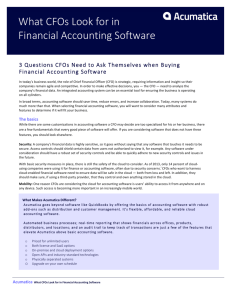

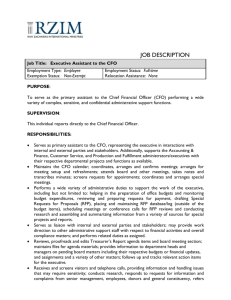
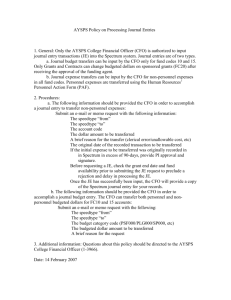
![Physical Resource and Techincal Infrastr[...]](http://s3.studylib.net/store/data/006918141_1-99e89495d67677efc270a59fb0075a90-300x300.png)
